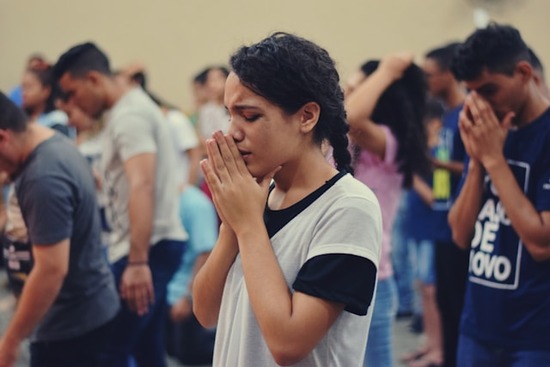No, Adventists definitely don’t believe they’re the only ones that will go to heaven. As a matter of fact, we don’t believe admittance into heaven is ever based on which church or denomination we belong to. People all over the world from different Christian denominations, religions, and walks of life will be welcomed by Jesus Christ.
This is because Scripture is clear that salvation is not dependent on fulfilling a certain list of requirements or being part of a certain club. It’s about knowing Jesus in a personal way (Matthew 7:22-23; John 17:3).
Join us as we answer:
- Is it necessary to be a Seventh-day Adventist to go to heaven?
- Do I have to be part of the remnant to go to heaven?
- What does the Bible say about who will go to heaven?
Is it necessary to be a Seventh-day Adventist to go to heaven?

Photo by Igor Rodrigues on Unsplash
Church membership, whether in the Seventh-day Adventist Church, Baptist Church, or some other denomination, doesn’t determine whether we end up in heaven. This is because our entry into heaven depends on our relationship with Jesus Christ. We believe in Him and receive from Him the gift of eternal life (Acts 16:31).
The tricky thing is, we as human beings tend to put so much emphasis on being part of a specific group that we forget membership in a certain faith community doesn’t necessarily mean anything. We could be part of a community but lack what matters most—a personal connection with God.
We could believe every doctrine of a specific church and follow the Ten Commandments to the letter but not have faith in Jesus, the Son of God—which is the only way to be saved (Ephesians 2:8-9).
Now, you may be wondering, What about being part of the remnant? You may have heard Adventists talk about this, and you’re wondering how that relates to salvation.
Let’s take a look at that next.
Do I have to be part of the remnant to go to heaven?

Image by Gerd Altmann from Pixabay
Adventists understand that all throughout history, there has always been a remnant—a group of people who choose to be faithful to God when society pressures them to cave. The remnant is not a group or church we “join” but rather a description of people faithful to Jesus. Revelation 14:12 describes a remnant in the end times who will help to warn the world of its final crisis.
One of the 28 Fundamental Beliefs, or foundational teachings of Seventh-day Adventism, summarizes the subject like this:
“The universal church is composed of all who truly believe in Christ, but in the last days, a time of widespread apostasy [turning away from the truth of God], a remnant has been called out to keep the commandments of God and the faith of Jesus. This remnant announces the arrival of the judgment hour, proclaims salvation through Christ, and heralds the approach of His second advent. This proclamation is symbolized by the three angels of Revelation 14; it coincides with the work of judgment in heaven and results in a work of repentance and reform on earth. Every believer is called to have a personal part in this worldwide witness.”1
The remnant in the last days
This concept of the remnant in the last days comes from our belief that at that time, the Great Controversy (the battle between good and evil, God and Satan) will come to a head in a crisis of worship. This crisis will divide everyone on earth into two groups—those who remain faithful to God and those who choose to follow human-made rules.
Bible prophecy represents these two groups as the faithful church of God and the unrighteous church of Babylon.
But note:
Church in the Bible doesn’t mean a building or a denomination. It refers to the body of believers in Christ.
The New Testament describes this church with the symbol of a pure woman, protected by God (Revelation 12:1, 6). Meanwhile, Revelation uses an unfaithful, adulterous woman called Babylon to represent the religious confusion through which Satan leads the world astray (Revelation 17:2-6).
Before Jesus comes, what’s left of the true church of God is called the remnant in the King James Version of the Bible (Revelation 12:17).
According to both Revelation 12:17 and 14:12, these people:
- Keep the commandments of God
- Have the testimony of Jesus
They will be a small group of God’s faithful followers who resist the false teachings of Satan’s counterfeit religion by following God’s law and holding onto the testimony and faith of Jesus.
To be clear, though, these followers don’t keep the commandments to earn salvation. Consistent with the rest of the Word of God (Ephesians 2:8-10; Romans 3:24), this passage simply describes what they do as a result of receiving Jesus’ salvation.
Although the Bible is clear that a remnant will have a special role at the end of time, the concept of a remnant is hardly new.
The remnant throughout the Bible
 Some of the earliest stories in the Bible talk about small groups of people who remained loyal to God and pointed others to His truth.
Some of the earliest stories in the Bible talk about small groups of people who remained loyal to God and pointed others to His truth.
One example in the Old Testament is the story of Noah and his family.
They were the only people who remained faithful to God in a wicked world. And they had a mission—to warn the people of the Earth of the impending flood (Genesis 6:5–7).
Similarly, the remnant who live right before Jesus comes will have a special warning known as the three angels’ messages (Revelation 14:6–12, 14). It’s a call for people to come out of religious confusion and glorify God as our Creator. It’s also a warning about false systems of worship.
Seventh-day Adventists seek to be part of this group of people, but they understand that the Bible doesn’t consider this group to be exclusive. All who follow Jesus faithfully will be part of it in the end times.
What does the Bible say about who will go to heaven?
One of the most well-known passages in the Bible emphasizes the truth about salvation that we find throughout its pages—“whoever believes in Him should not perish but have everlasting life” (John 3:16, NKJV). Belief in Jesus Christ is the prerequisite for heaven (Romans 10:9–13).
This belief isn’t simply a belief in God’s existence, however (James 2:19). It’s about trusting Him and His power to save us through a personal relationship with Him. That’s why John 17:3 tells us that knowing Jesus Christ is the essence of eternal life.
It’s the kind of faith and love for Him that motivates us to follow Jesus—not out of a need to earn His favor but because we already have His favor. And this faith and love are revealed through obedience (John 14:15).
So, being ready for heaven all comes down to the process of justification and sanctification.
We’re justified (forgiven and cleansed) when we accept Jesus’ sacrifice for our sins (Romans 3:38; 1 John 1:9). That begins the process of sanctification—or growth—as we daily surrender our hearts to God. Neither of these stages is about earning heaven. Rather, they both involve a conscious decision to accept Jesus’ payment for the wages of sin and surrender to following His will.
God wants everyone in heaven
God offers the gift of eternal life to everyone—regardless of denomination. His greatest desire is for all of us to be saved (1 Timothy 2:4–6), and it pains Him when people choose to turn away from His gift (Ezekiel 33:11).
He sees each of us as individuals. He sees the condition of our hearts and where we’re at on our spiritual journeys. And with that in mind, He guides us to a deeper understanding of truth.
We might not all be in the same place on our journeys.
We might not come to the same conclusions on every topic.
But God sees us for who we are, meets us where we’re at, and promises to help us grow into the people He made us to be.
Want to better understand Seventh-day Adventist beliefs about salvation?
Related pages
- “What Adventists Believe About the Remnant in the Bible,” Seventh-day Adventist World Church, https://www.adventist.org/remnant-and-its-mission/. [↵]
More Answers
Does the Seventh-day Adventist Church Believe in Paying Tithe?
Seventh-day Adventists believe in paying tithe and offerings based on the biblical command and our commitment to being wise stewards of God’s resources. These donations help fund the mission of the Adventist Church by supporting pastors, missionaries, church expenses, and evangelistic projects, among other things.
Seventh-day Adventist World Population and Demographics
The Adventist Church has more than 22 million members and 100,000 churches worldwide, plus a large system of hospitals, schools, and publishing houses. Learn more about this diverse church.
What Is a Seventh-day Adventist Camp Meeting?
Although camp meetings didn’t begin with the Seventh-day Adventist Church, they’re as much an Adventist thing as haystacks.
Camp meeting is an extended event for Adventists (and non-Adventists) of all ages to gather and participate in spiritual seminars and activities. During the event, attendees often camp in tents, campers, or RVs.
How to Join the Seventh-day Adventist Church
Whether you heard about the Seventh-day Adventist Church through a traveling evangelist, during your online searches, or through a loved one or relative, you might be considering joining yourself.
How Do Adventists Do Baby Dedications?
For Christians, dedication ceremonies for babies, also for older children, are an important time for parents and the church. It’s a special part of the worship service when parents present their young children to God and the church family. Both parents, along with the congregation, regard this as a solemn promise to be a Christ-like example to the child.
Do Adventists Celebrate Communion and Foot Washing?
Like many Christian denominations, Adventists regularly participate in communion, also referred to as the “Lord’s Supper” or the “Last Supper.” They also practice foot washing (John 13:1-20), or the “ordinance of humility,” during the service—which isn’t as common.
What is the Concept of “Present Truth” and Why is it Important?
Present truth is the principle that certain biblical truths are relevant to God’s people at specific times in history. God sends the Holy Spirit to reveal truths that help us better understand how to interpret and apply His Word in a present moment.
Do Seventh-day Adventists Celebrate Easter
Yes, many Seventh-day Adventists do celebrate Easter.
Does the Adventist Church Have Youth Ministry Programs?
The Seventh-day Adventist Church has been organizing and operating youth ministry programs since 1879.
In our opinion, youth ministry is one of the most important ministries a church can have.
Do Adventists Celebrate Birthdays?
Yes, most Seventh-day Adventists do celebrate birthdays because we see them as excellent reminders of the life God has blessed us with. And we celebrate them the same way everyone else does—with friends, family, presents, and a special meal.
Sola Scriptura—What It Means and Why It Matters
Sola scriptura is a term that originated during the Protestant Reformation. It represents the way many Christians view the Bible and its authority. While the idea is simple enough, there is so much more to sola scriptura than its basic definition.
What Do Adventists Offer for Young Adults?
In recent years, the age group often classified as “young adults” has been trickier to engage. It’s been a significant concern for Christian churches around the world. Though interestingly enough, similar observations regarding young adults have been coming up in conversations about the economy, the entertainment industry, politics, and more.
Do I Need to be an Adventist to be Saved?
The answer to this question is simply, “no.”
When it comes to salvation in Jesus Christ, all that is required of a person is to acknowledge Jesus’ sacrifice for us, believe that He has saved us, and claim the free gift of salvation that is always available to us. Salvation is not based on denomination.
Do You Have to Be Vegetarian to Be Adventist?
Of course not. Membership in the Seventh-day Adventist Church has never included any dietary requirements. However, there might be some reasons people might think that. So many Adventists are vegetarians or even vegan, and a plant-based lifestyle has many health benefits.
All About Seventh-day Adventist Colporteurs
The Seventh-day Adventist Church uses a variety of methods to spread the hope of the gospel to the world. One of these ways is through colporteuring, also called “canvassing” or “literature evangelism.”
What Is an Adventist Book Center (ABC)?
When you walk into any one of the many Adventist Book Center (ABC) locations, chances are you’ll be greeted by pleasant gospel music in the background, friendly employees, and row after row of Christian books, movies, Bibles, study guides, kids’ games, and more.
Do Seventh-day Adventists Celebrate Holidays?
Wondering whether your Adventist classmate or coworker keeps the same holidays you do? Perhaps you want to include them in some festivities, but you also want to respect their beliefs. Thus, you’re unsure of how to navigate the holiday question. Will they accept your invitation to the office Christmas party?
The Adventist Haystack (It’s Not What You Think) + 4 Recipes
Haystacks are basically a taco salad—with an Adventist spin on it! Most versions are vegetarian and offer an endless combination of tasty toppings. We eat them often because they’re healthy, scrumptious, and easy to make.
Do Seventh-day Adventists Believe in Medical Care?
The Seventh-day Adventist Church believes in and supports evidence-based medical care. In fact, medicine has played a significant part in our history, and today we run a major health system with hospitals, medical schools, and clinics throughout the world.
Why do Adventists Emphasize Religious Liberty?
Adventists see religious liberty as an essential human right. After all, God endowed humanity with freedom of choice from the very beginning. So we believe it’s best for governments to also support their citizens’ rights to worship based on their convictions.
All about Adventist Elementary Schools
The Seventh-day Adventist Church operates the largest Protestant education system in the world. A big part of this system is our K-8 elementary schools, or primary schools, as they’re known in other parts of the world.
What Are Pathfinder and Adventurer Clubs?
Like the boy or girl scouts, Pathfinders and Adventurers learn about nature and life skills. But what makes these clubs special is their purpose to bring young people closer to Jesus.
13th Sabbath Offering: What It Is and Why It Matters
While the previous 12 Sabbaths of the quarter feature an established Adventist ministry and its current giving needs, the 13th is a rotating spot reserved for current mission projects.
A Look at Adventist Colleges and Universities
On the outside, Seventh-day Adventist universities may not look much different than other college campuses. But the real differences are beneath the surface.
What Is ASI (Adventist-Laymen’s Services and Industries)?
ASI, which stands for Adventist-laymen’s Services and Industries, is a membership-based organization that provides support for Seventh-day Adventist laypeople (Adventist professionals who aren’t pastors).
What Are Adventist Evangelistic Meetings?
The Seventh-day Adventist Church puts a huge emphasis on sharing the gospel through evangelism, or sharing the gospel through preaching, teaching, and testimony. One of the ways we accomplish this is by organizing public events called evangelistic meetings.
Christian Summer Camps—A Cherished Adventist Ministry
School’s out, the sun’s shining, and your kids are thrilled to have the summer ahead of them. Then three days in, you hear, “I’m bored…”
Do Adventists Have Their Own Bible?
Adventists have some unique beliefs—you might be able to name some of them right now. The seventh-day Sabbath. Death as a sleep. Hell as nonexistence.
What Is Vespers?
Friday rolls around, and you’re spending time with your Adventist friends or relatives when they mention they’re going to vespers tonight.
Didn’t find your answer? Ask us!
We understand your concern of having questions but not knowing who to ask—we’ve felt it ourselves. When you’re ready to learn more about Adventists, send us a question! We know a thing or two about Adventists.

































